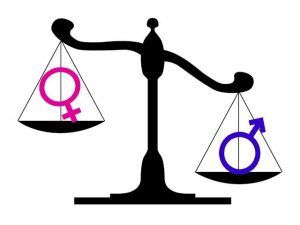
image: the Chronicle
To anyone who has experienced gender or other forms of discrimination, in the workplace or outside, it is likely unsurprising that pay disparity—one of the clearest markers of discrimination –is linked with anxiety and depression. In addition to pay discrimination on the basis of gender, other manifestations of workplace discrimination include discrimination in hiring, promotion, and having disproportionate numbers of one sex in positions of power and leadership roles. There are also extremely egregious, as well as more subtle types of gender discrimination. The #metoo movement and related disclosures of rights violations has drawn attention to pervasive sexual assault, harassment and gender discrimination in the workplace and beyond, as well as the widespread impunity around such cases. Such rights violations are especially egregious in cases where power dynamics in predominantly male-controlled work places are used to exploit subordinates and perpetuate cycles of violence, harassment and discrimination; in such environments, victims often lack meaningful accountability mechanisms.
More subtle manifestations of discrimination may significantly impact the everyday lives of women and gender minorities, the compiling effect of which may result in unrepentantly hostile work environments. ‘Mansplaining’—and the fact that there is need for such a term—is an excellent example. “Mansplaining” describes the phenomenon that some individuals, including myself, have experienced where one explains something “without regard to the fact that the explainee knows more than the explainer,” which is often done by a man to a woman. Another example is assigning more ‘critical’ assignments to men which are more likely to advance their careers while assigning ‘lesser’ roles to women. Other forms include utilizing aggressive techniques, coercion, and power dynamics to pressure persons into doing a task. Such use of power dynamics is not dissimilar from circumstances often reported in the context of sexual assault cases and often underscores entrenched misogyny and/or undervaluing of women.
Gender discrimination remains pervasive in many countries. In the United States, women still earn only 82 cents for every dollar earned by men. However, if additional factors are taken into account, the statistics are even more grim. The World Economic Forum Global Gender Gap Index, which not only covers salaries, but also workforce participation and leadership in the economic pillar, found that in the U.S., women’s average income as a percentage of men’s was approximately 64.8%. Concerningly, the Global Gender Gap Index found that in 2017, gender inequity is widening, not closing.
Gender discrimination and pay disparity is not only inherently wrongful, illogical and in direct violation of international human rights law and constitutional and legal protections in most countries, but also has serious mental health implications for those suffering from it. A 2016 Columbia University study found that women who made significantly less than their male counterparts (controlling for age, education, profession, among other factors) were four times more likely to suffer from anxiety and 2.4 times more likely to suffer from depression. Importantly, these findings held true at high income levels (i.e. for executives), meaning that negative mental health implications of pay disparity were not solely related to poverty or inadequate resources. Other studies have also shown that perceptions of gender discrimination harm physical and mental health.
One researcher poignantly explained that a combination of factors likely contribute to the correlation between pay inequality and poor mental health stating, “[t]he wage gap represents so much that is unseen.” Indeed, the wage gap, and all it represents, not only illustrates that there is insufficient political and workplace will to tackle this issue, but underscores that many workplaces simply value women and their work contributions less than their male counterparts. It should not be surprising that victims of discrimination suffer from poor mental health outcomes upon realization that they are considered lesser humans than their colleagues, that their governments and employers have failed to protect their rights. However, it is quite shocking that inequality remains so inadequately prevented and addressed despite all the evidence of its harms.



